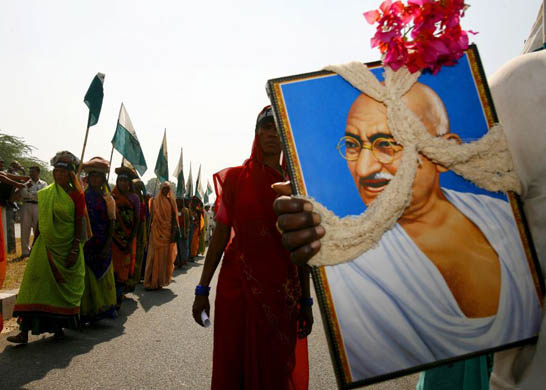Lang Professor Lecture
George Lakey
Lang Center for Civic and Social Responsibility
Peace and Conflict Studies Program
Swarthmore College
“Post Election Reflection”
November 17, 2008
4:15-5:45 p.m.
Scheuer Room
Kohlberg Hall
Swarthmore College
Now that we know who the next U.S. President will be, what are some options for people who want major change in national policies both domestic and foreign, in the direction of justice, peace, and environmental sustainability?
George Lakey will present a multi-dimensional strategic framework for radical change.? Based on research but guided by vision, the framework offers meaningful actions for the next four years for people with diverse gifts and backgrounds seeking unity of collective strength.
Lakey is in his third and final year as Eugene M. Lang Visiting Professor for Issues in Social Change.? In a fifty-year span he has authored seven books, facilitated1500 workshops on five continents, and led social change projects on local, national, and international levels.? A Quaker, he was first arrested for a civil rights sit-in in Chester, PA.
————————

George Lakey began his career as a trainer at the Martin Luther King School for Social Change, and has since gone on to lead over 1000 workshops on five continents. He has run trainings for coal miners, therapists, homeless people, prisoners, Russian lesbians and gays, Sri Lankan monks, Burmese guerrilla soldiers, striking steel workers, South African activists, and others. Trained as a sociologist, he has taught at the college and graduate level and is the author of six books. He consults regularly with a wide range of nonprofit groups.
George has given leadership to a number of social change movements. In late 1989 he led a team of Westerners in Sri Lanka who for 24 hours a day accompanied human-rights activists at risk of assassination. He has done neighborhood organizing, once successfully preventing tree-cutting and another time creating a neighborhood festival to celebrate ethnic diversity. He co-founded the Movement for a New Society, which for nearly 20 years specialized in organizational innovation. He founded and directed the Philadelphia Jobs with Peace Campaign, a coalition of labor, civil rights, poverty and peace groups. He was a designer of and staffed the Campaign to Stop the B-1 Bomber and Promote Peace Conversion, which mobilized sufficiently to gain cancellation of the B-1 in 1977 and raise the visibility of the concept of economic conversion. He was director of A Quaker Action Group when it assisted Puerto Rican nationalists in stopping the U.S. Navy from using the inhabited island of Culebra for target practice. He was also a founder of Men Against Patriarchy, which organized pioneering projects for the early men’s anti-sexism movement of the mid-’70s.
George has taught peace studies at Swarthmore and Haverford Colleges, Temple University and the University of Pennsylvania. At Penn he brought the program from 11 students in one class to 105 in three sections; the administration lauded the program for the way it reached out to students of color. He also created a group dynamics lab at Penn for training men in new leadership styles under a federal grant for feminist education.
George’s sixth book is on organizational development: “Grassroots and Nonprofit Leadership: A Guide for Organizations in Changing Times” (1996). He is author or co-author of five previous books: “A Manual for Direct Action” (often called the “Bible” of direct action by Southern civil-rights activists of the ’60s); “In Place of War, Moving toward a New Society”; “No Turning Back: Lesbian and Gay Liberation for the ’80s”; and “Powerful Peacemaking: A Strategy for a Living Revolution.” His publications have been translated into Swedish, German, Danish, French, Japanese and Thai.
On the personal side, George is a Quaker, father, grandfather, and great-grandfather in an interracial family. He received the national Giraffe Award (1992) for “sticking his neck out for the common good,” and the Ashley Montague Peace Award (1998) from the International Conference on Conflict Resolution.
bio from http://trainingforchange.org/content/view/29/45/index.html
 “Nonviolent Action and the Struggle for Land: Experiences in India and Brazil”
“Nonviolent Action and the Struggle for Land: Experiences in India and Brazil” 